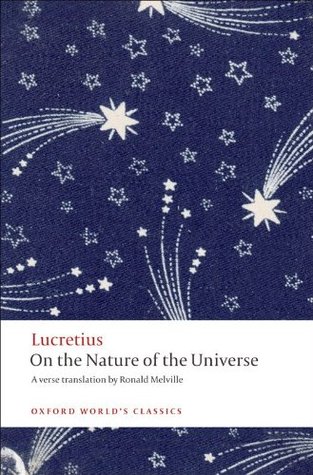More on this book
Community
Kindle Notes & Highlights
The desire for the pleasures of the senses is not necessary—one can live on gruel and water, one does not die without sex—but it is perfectly natural. As soon, however, as one starts to want not just something pleasant to drink but a particular vintage of a particular wine, and not just sexual pleasure but sexual pleasure with a particular person, one is no longer listening to the body, but to the mind; an obsession is developing whose inevitable consequence is displeasure that the desired object is missing or anxiety that it might be.
nothing ever by divine power comes from nothing.
For if things came out of nothing*, all kinds of things Could be produced from all things. Nothing would need a seed.
And why do roses flourish in the spring* And corn in summer’s heat, and grapes in autumn, Unless because each thing that is created 175 Displays itself when at their own due time Fixed seeds of things have flowed together, and the seasons Attend, and safe and sound the quickened earth Brings tender growth up to the shores of light?
each thing gets its growth 190 And nourishment from its own material. And
Therefore no single thing returns to nothing But at its dissolution everything Returns to matter’s primal particles.
Therefore nature works by means of hidden bodies. Yet all things everywhere are not held in packed tight In a mass of body. There is void in things
All nature, as it is in itself, consists Of two things*: there are bodies and there is void
For whatever is done must be an accident Either of the whole earth or of some place in it. 470 Moreover, if no matter had existed Nor room or space for things to operate, The flame of love would never have been fired
Atoms therefore are solid single wholes Cohered from smallest parts close packed together, 610 Not compounds formed by gathering of parts, But strong in everlasting singleness.
So then what difference will there be between The sum of all things and the least of things? There will be none at all. For though the sum of things 620 Will be completely infinite, the smallest bodies Will equally consist of infinite parts. But
find then that the universe is not bounded In any direction. If it were, it would need to have An extremity. But nothing can have an extremity Unless there is something outside to limit it, 960 Something beyond to bound it, some clear point Further than which our senses cannot reach.
when time 450 With its strong hours has marred them, and the limbs Have fallen beneath its blows, the intelligence Limps, the tongue rambles, the mind gives way*, All fails and in one single moment dies. 455 Therefore it follows that like smoke* the spirit Is melted into air, into thin air, Since with the body equally it is born And grows, and dies when old age wearies it.
Therefore death nothing is to us*, nothing 830 That matters at all, since mind we know is mortal.
Then we must ask, what bitterness is this, If all things end in sleep and quiet, that 910 A man can waste away in ceaseless grief. 911 For no one feels the want of himself and his life 919 When mind and body alike are quiet in sleep. 920 For all we care, that sleep might have no end. Free from all yearning for ourselves we lie.
Therefore always in vain and uselessly 1430 Men labour, and waste their days in empty cares, Because they fail to see what bounds are set To getting, and what limits to true pleasure.


